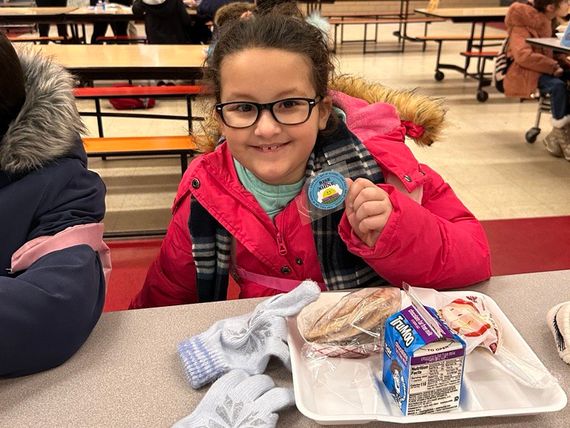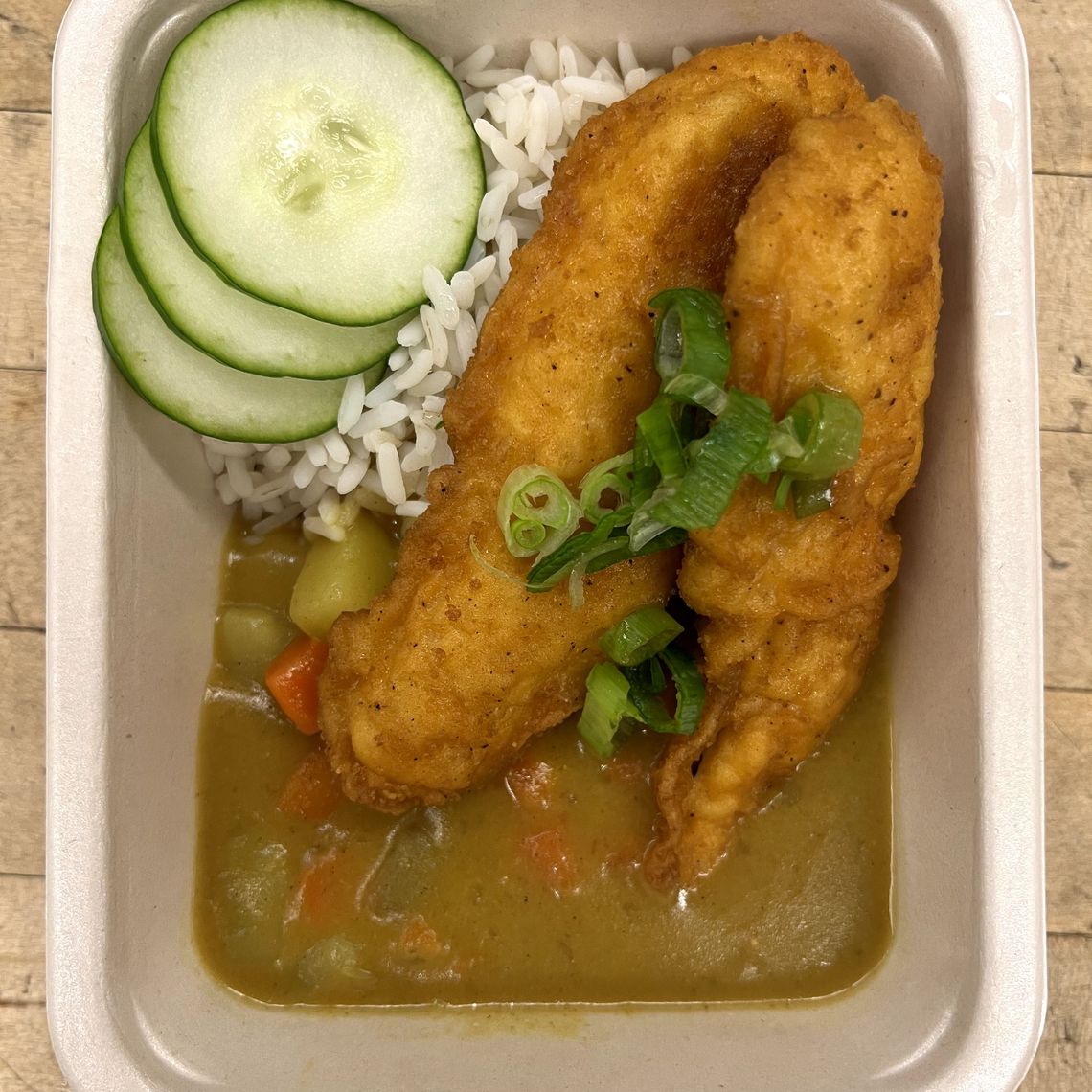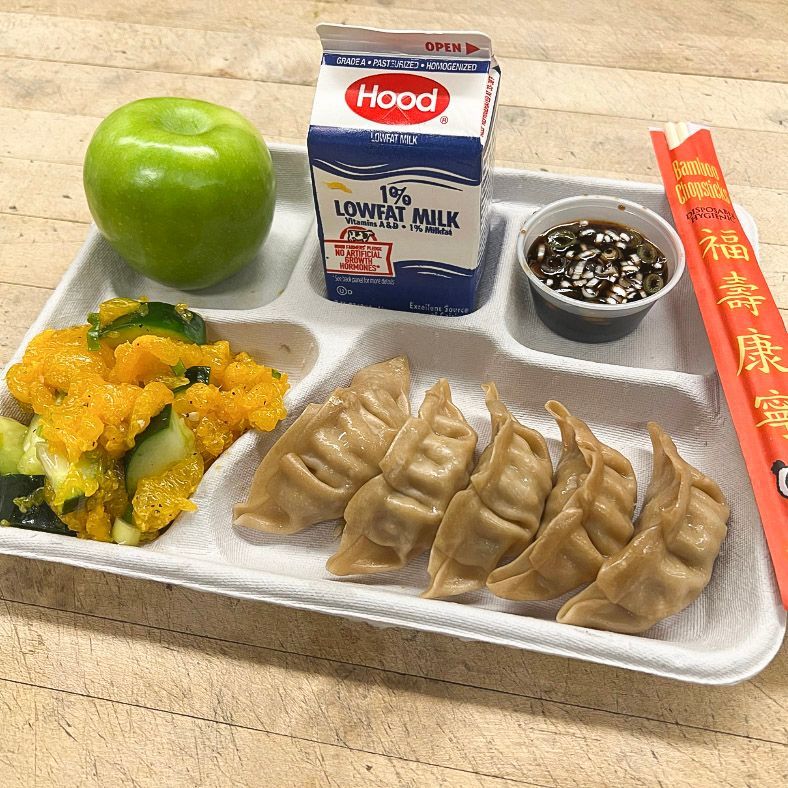From Sicily to North Quincy High School: One Chef’s Journey to Feeding Kids
Olivia Deng

Cooking has always been Monica Gurwitch’s happy place. But when she first moved here from Italy 25 years ago, she never could have imagined that today she’d be responsible for serving nearly a thousand lunches every day.
“I started working in the school system as a sub, probably about 12 years ago,” she recalls. After years as a cafeteria helper, she is now the full-time manager and head cook at North Quincy High School.
It’s not just about feeding students. It’s also about delighting them with flavors that are both exciting and familiar.
One of her proudest triumphs is a dish that surprised even her, a Japanese style chicken katsu curry. “There is a specific one place here that does this curry…and I love it…I feel like this is going to be a big hit,” Chef Monica explains. Teaming up with Project Bread Chef Educator Ryan Eckles, Chef Monica recreated a cafe favorite for the school cafeteria. This dish includes caramelized onions, potatoes, and carrots served over brown rice. All topped with a homemade curry roux and crispy chicken tenders that no kid could pass up. Students swarmed the feedback board she had set up with thumbs up stickers. “Everybody was saying that it was really, really good.”
Chef Monica’s curry recipe is more than a tasty meal. It represents what is possible when school food staff are empowered to innovate. The purpose of Project Bread’s School Food Fellowship is to nurture and support strong spirits like Chef Monica across Massachusetts.
This program helps school nutrition teams grow, so they can better meet students’ nutritional needs and wants at school. They learn to cook from scratch, craft new recipes, and provide culturally relevant meals that kids can share with friends. The Fellowship offers hands-on training, on-site chef mentorship, and resources. This helps cafeterias like Chef Monica’s transform into lively test kitchens where creativity and community connection can grow.
A Program Designed to Transform School Meals
Sam Icklan, Director of Community Nutrition Services at Project Bread, leads the program to support cooks like Chef Monica. “We partner with them to provide professional development and training for the school nutrition staff to ensure that the staff are equipped to provide really high quality amazing meals for their students,” says Chef Sam.
First launched in 2021, Project Bread’s School Food Fellowship offers a two-year chance for school nutrition staff to grow professionally.
Participants get monthly online training and several weekly site visits from our chef educators. Each fellowship district teams up with our chef educators. Together, they build skills in scratch cooking, equipment use, recipe development, and menu planning. Trainings cover a wide range of topics, from plant based entrees to reducing food waste.
Thanks to our donors, we work with school districts to improve their meal programs. Why? To feed more kids, of course!
The better meals look, smell, and taste, the more likely kids are to eat and enjoy them. And we all know how important it is for kids to get proper nutrition while at school.

I was lucky to see two Professional Development Days. One featured Project Bread chef educators showing how to make “Wally’s Booyah Nachos.” The other had school nutrition staff creating a chicken salad recipe. Both sessions let school nutrition professionals learn to make enriching meals for students. The second session also encouraged creativity and teamwork.
Chef Educator Sherry Hughes spends her days in school kitchens across the state. She sees how this model creates real change. “School districts give us feedback that indicates what works and what does not,” Chef Sherry explains. “It is clear that our presence and training fosters a sense of pride in the food served, more confidence about their work and role in school nutrition. And our support for school meals that focus on more culturally appropriate food has been a game changer for some schools. We encourage staff members to play a bigger role in creating flavors that mirror the student's taste.”
The Fellowship is intentionally flexible so it can meet each district where they are. “The school nutrition directors will let us know prior to our start in the kitchens what they would like us to focus on. If the meals program is moving toward more scratch cooking, for example, we may focus on knife skills, how to use equipment they aren't used to or how to prep ahead to be more prepared for the next day,” says Chef Sherry. “Outside of our work in kitchens, we have the opportunity to focus on specific subjects through our monthly online classes.” For example, Halal food is a growing focus.
This tailored approach is how we respond to new trends in student tastes and nutrition science. Chef Sherry points to plant based cooking as a growing area of interest and describes some crowd pleasing examples. The Butternut Squash and Kale Quesadilla with Chipotle Sauce Chef Sam created was a hit. “We taste-tested it last year in lots of schools and students and staff all loved it,” she says. The Green Monstah Pizza uses pre-made garlic and cheese pizzas. It adds kale pesto and roasted zucchini, which excited students’ taste buds. These recipes offer more vegetables and fun flavors while helping school staff gain new culinary skills for everyday use.
Why are the stakes so high? Because school meals make up a significant share of what many children eat in a day. As Chef Sherry emphasizes, “Our support for school meals that focus on more culturally appropriate food has been a game changer for some schools,” and the meals themselves often supply much of a child’s daily nutrition. Breakfast and lunch at school are the most reliable meals that many students receive. So quality and variety are critical.
Chef Sam underscores that the Fellowship is designed to create lasting change rather than short term improvements. “We really want something that's going to last into the future. We’re looking for school nutrition programs that are interested in creating impactful and lasting change and who want to collaborate with us on that.”
The School Food Fellowship combines training, on-site mentoring, and teamwork. This helps cafeteria teams cook from scratch, embrace cultural diversity, and keep menus fresh and exciting even after the two-year partnership ends.
Chef Monica's Kitchen: Creativity Meets Community
North Quincy High is a perfect match for the Fellowship’s collaborative spirit. "We serve about 1,000 [lunches] a day," Chef Monica says. She highlights the challenge of making meals that are tasty, healthy, and quick to serve. Project Bread’s chef educators, especially Chef Ryan, became close partners. “When I became an active manager, it was a click and it's like, ‘Oh my god, we like the same, we like good food.’ We want to experiment…different things for the kids.”
Together they developed a series of standout recipes, one of which being Japanese Curry. It has chicken tenders, savory curry sauce, potatoes, and carrots, all served with brown rice. “Every time I do a new recipe, I put out a board in the cafeteria … I think we had so many thumbs up … everybody was saying that it was really, really good,” Chef Monica says proudly.

Her next big hit was Korean barbecue chicken. It was inspired by the delicious smell of a student’s takeout meal. “The smell [was] so good. And I said to this student, what are you guys eating? Oh, it's Korean chicken,” she recalls. Knowing deep frying was not feasible in the school kitchen, Chef Monica improvised with a baked version brushed with Korean barbecue sauce. “It definitely was a big hit, as much as the curry.”
These recipes are more than crowd pleasers. Chef Monica’s dedication to her students shines through. The Fellowship inspires innovation and boosts confidence among school food professionals.
Culturally Relevant Meals Build Connection
For both Chef Monica and Chef Sam, serving culturally diverse food is about more than flavor. It is about respect and belonging. Chef Monica sees it every day. “I feel like … you can serve a cheeseburger, you can serve mac and cheese. Quincy … [has] a high number of Asian people. … I feel like sometimes it's nice to have … different [meals].”
She loves introducing students to new tastes. “Given the opportunity to try and say, Oh good, this is something that I never tried before, but I like it … I think it's interesting.”

Chef Sam agrees. “I think that it's really meaningful to students to see meals on their school lunch menu that are familiar and that are representative of who they are, and can show a piece of their background of their family's heritage to other students in their school,” Chef Sam says. “Food is often an opportunity for a conversation and connection … a really beautiful connection that we all share.”
That philosophy aligns perfectly with Chef Monica's approach. Whether she is serving curry or Korean barbecue, she listens closely to student feedback and sees her cafeteria as a space for cultural discovery. “It makes your day,” she says of hearing students’ praise. “Kids come to me and say, ‘Oh my God, this meal was really good.’ That makes me feel good.”
Sustaining Impact
The Fellowship does not just spark new recipes. It strengthens entire school meal programs. Icklan notes the program helps districts address challenges from funding to kitchen equipment and staffing, while keeping menus “current and exciting” by “listening to the students” and the staff.
Chef Monica has seen participation soar since Massachusetts adopted universal free school meals. “We were serving 400 to 500 meals in 2017, and we doubled that. Free [meals] helped a lot of the students … to get lunch.” With more students eating and loving the meals, she focuses on presentation as well as taste. “If you present that food in a nice way … you eat a lot with your first impression.”

Even after a fellowship cohort ends, Project Bread stays connected. “We engage our alum districts … and offer them ongoing professional development opportunities. They can call us anytime they need a new recipe or have a question or would like us to come in,” Chef Sam explains.
North Quincy High now serves as a model for other districts. Chef Monica delights in the creativity. “I always like to improve the recipe or make a little different every time, and then make it better. … My kitchen is more like a test kitchen. So we test it out, and [when] we have a good response, it's good.”
"We were serving 400 to 500 meals in 2017, and we doubled that. Free [meals] helped a lot of the students … to get lunch." - Monica Gurwitch
Looking Ahead for the School Food Fellowship
The next phase of the Fellowship promises even more opportunities. Project Bread is thrilled to partner with Worcester and Holyoke for the 2025–2026 school year. “Both school districts are new to us this year,” Chef Sherry says, “In a way, it's a clean slate. We are there to be of service. The way we work with the staff is to give them new tools to use, share our knowledge and experience and get them excited about their jobs, their influence on students and the importance of school meals. That's all exciting stuff!”
With each new district, we strengthen our promise to support school food professionals. This helps ensure that more children get nutritious and culturally relevant meals.
Take Action to Feed Kids
Chef Monica’s story shows how a committed cook, backed by the School Food Fellowship, can make school meals joyful for many students. Her famous chicken katsu curry symbolizes what’s possible. This dish came from curiosity, improved through teamwork, and is loved by students from all backgrounds.
Project Bread’s fellowship shows that investing in school nutrition staff leads to lasting change. This includes training, creativity, and collaboration. As Chef Sam puts it, “We know that the school meals are a really important resource, so ensuring that they're delicious and exciting and familiar to the kids … strengthens these programs.”
You can help fuel kids to success. Donate to Project Bread today. Your support helps the School Food Fellowship. Let's work together to make sure every child in Massachusetts gets fresh, healthy meals at school.